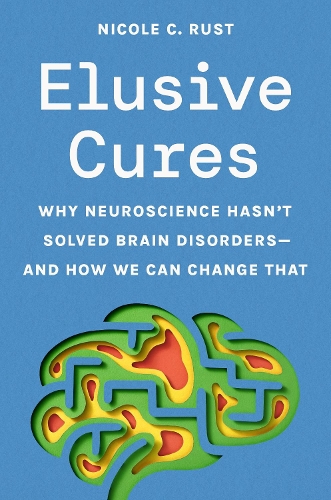
Elusive Cures: Why Neuroscience Hasnt Solved Brain Disordersand How We Can Change That
(Hardback)
Publishing Details
Elusive Cures: Why Neuroscience Hasnt Solved Brain Disordersand How We Can Change That
By (Author) Professor Nicole C. Rust
Princeton University Press
Princeton University Press
17th September 2025
United States
Classifications
Tertiary Education
Non Fiction
Cognitive and behavioural neuroscience
Physiological and neuro-psychology, biopsychology
Diseases and disorders
Physical Properties
Hardback
296
Width 156mm, Height 235mm
Description
A neuroscientist's bold proposal for tackling one of the greatest challenges of our time-brain and mental illnesses
Brain research has been accelerating rapidly in recent decades, but the translation of our many discoveries into treatments and cures for brain disorders has not happened as many expected. We do not have cures for the vast majority of brain illnesses, from Alzheimer's to depression, and many medications we do have to treat the brain are derived from drugs produced in the 1950s-before we knew much about the brain at all. Tackling brain disorders is clearly one of the biggest challenges facing humanity today. What will it take to overcome it Nicole Rust takes readers along on her personal journey to answer this question.
Drawing on her decades of experience on the front lines of neuroscience research, Rust reflects on how far we have come in our quest to unlock the secrets of the brain and what remains to be discovered. She shows us that treating a brain disorder is more like redirecting a hurricane than fixing a domino chain of cause and effect, arguing that only once we embrace the idea of the brain as a complex system do we have any hope of finding cures. Rust profiles the pioneering ideas about the brain that are driving research at the cutting edge to illuminate exactly how much we know about disorders such as Parkinson's, epilepsy, addiction, schizophrenia, and anxiety-and what it will take to eradicate these scourges.
Elusive Cures sheds light on one of the most daunting challenges ever confronted by science while offering hope for revolutionary new treatments and cures for the brain.
Author Bio
Nicole C. Rust is professor of psychology at the University of Pennsylvania. Recipient of the Troland Award from the National Academy of Sciences, she is a contributing editor at The Transmitter, a leading brain research news magazine.
